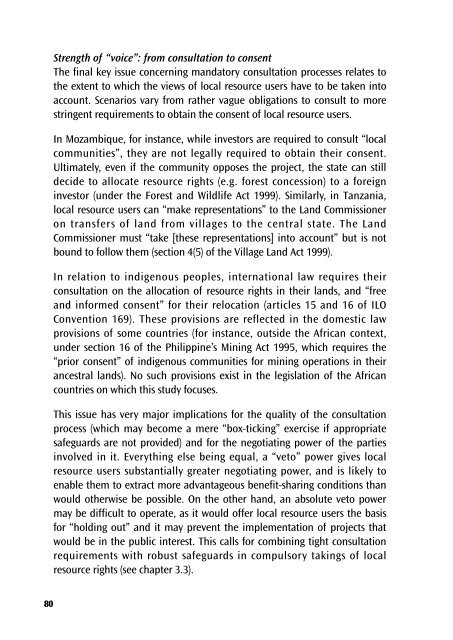Legal empowerment for local resource control
Legal empowerment for local resource control
Legal empowerment for local resource control
Create successful ePaper yourself
Turn your PDF publications into a flip-book with our unique Google optimized e-Paper software.
80<br />
Strength of “voice”: from consultation to consent<br />
The final key issue concerning mandatory consultation processes relates to<br />
the extent to which the views of <strong>local</strong> <strong>resource</strong> users have to be taken into<br />
account. Scenarios vary from rather vague obligations to consult to more<br />
stringent requirements to obtain the consent of <strong>local</strong> <strong>resource</strong> users.<br />
In Mozambique, <strong>for</strong> instance, while investors are required to consult “<strong>local</strong><br />
communities”, they are not legally required to obtain their consent.<br />
Ultimately, even if the community opposes the project, the state can still<br />
decide to allocate <strong>resource</strong> rights (e.g. <strong>for</strong>est concession) to a <strong>for</strong>eign<br />
investor (under the Forest and Wildlife Act 1999). Similarly, in Tanzania,<br />
<strong>local</strong> <strong>resource</strong> users can “make representations” to the Land Commissioner<br />
on transfers of land from villages to the central state. The Land<br />
Commissioner must “take [these representations] into account” but is not<br />
bound to follow them (section 4(5) of the Village Land Act 1999).<br />
In relation to indigenous peoples, international law requires their<br />
consultation on the allocation of <strong>resource</strong> rights in their lands, and “free<br />
and in<strong>for</strong>med consent” <strong>for</strong> their relocation (articles 15 and 16 of ILO<br />
Convention 169). These provisions are reflected in the domestic law<br />
provisions of some countries (<strong>for</strong> instance, outside the African context,<br />
under section 16 of the Philippine’s Mining Act 1995, which requires the<br />
“prior consent” of indigenous communities <strong>for</strong> mining operations in their<br />
ancestral lands). No such provisions exist in the legislation of the African<br />
countries on which this study focuses.<br />
This issue has very major implications <strong>for</strong> the quality of the consultation<br />
process (which may become a mere “box-ticking” exercise if appropriate<br />
safeguards are not provided) and <strong>for</strong> the negotiating power of the parties<br />
involved in it. Everything else being equal, a “veto” power gives <strong>local</strong><br />
<strong>resource</strong> users substantially greater negotiating power, and is likely to<br />
enable them to extract more advantageous benefit-sharing conditions than<br />
would otherwise be possible. On the other hand, an absolute veto power<br />
may be difficult to operate, as it would offer <strong>local</strong> <strong>resource</strong> users the basis<br />
<strong>for</strong> “holding out” and it may prevent the implementation of projects that<br />
would be in the public interest. This calls <strong>for</strong> combining tight consultation<br />
requirements with robust safeguards in compulsory takings of <strong>local</strong><br />
<strong>resource</strong> rights (see chapter 3.3).

















